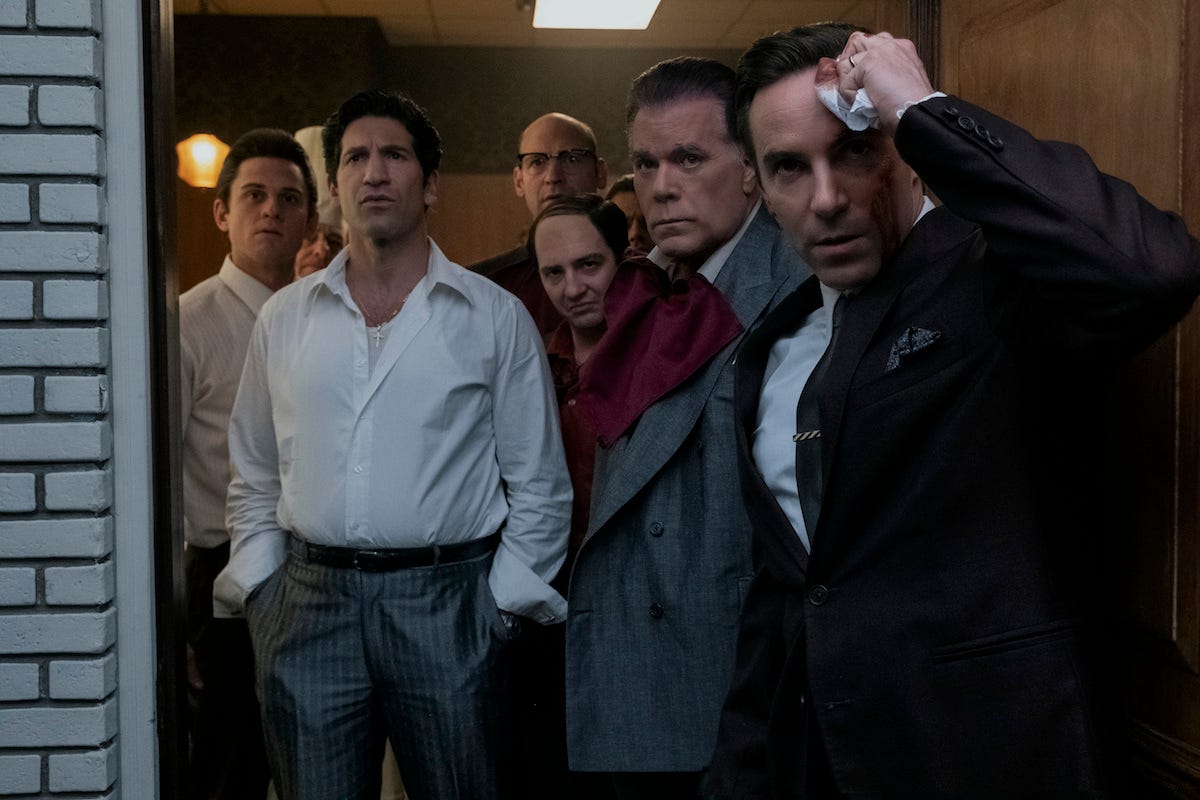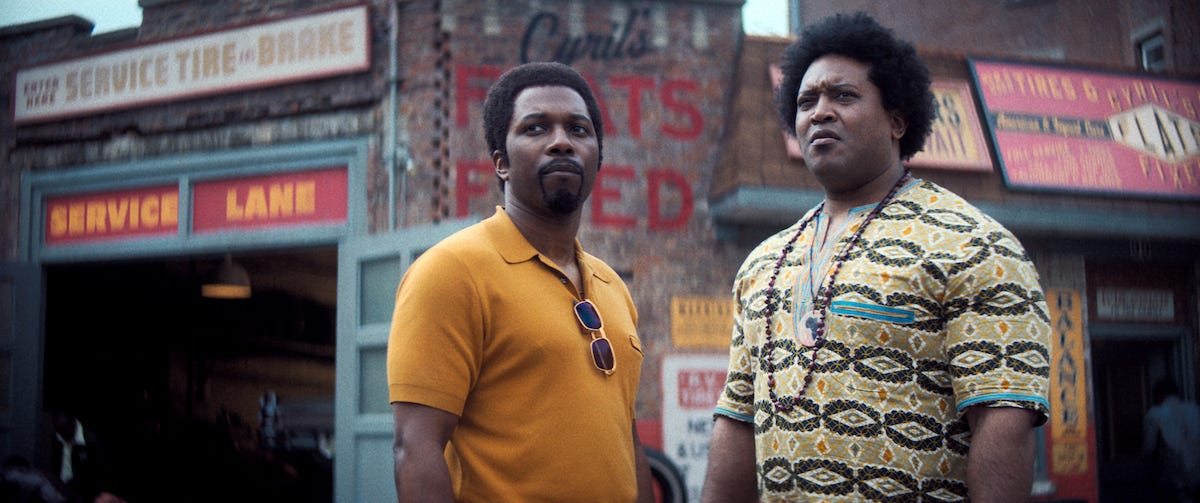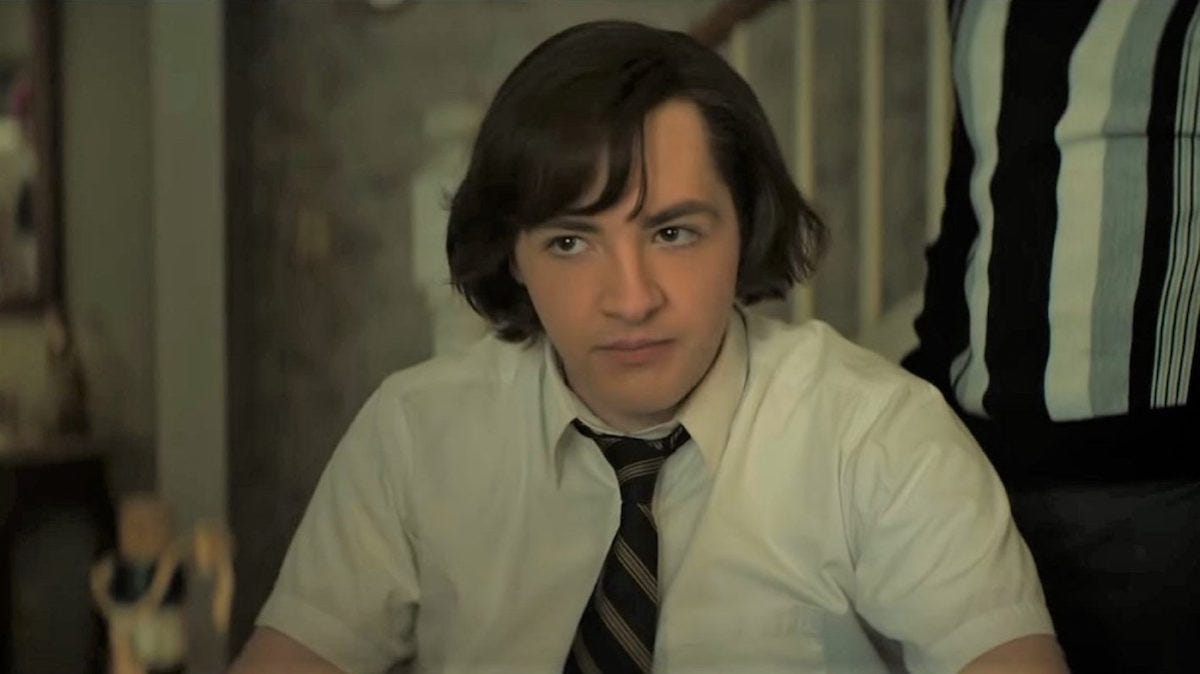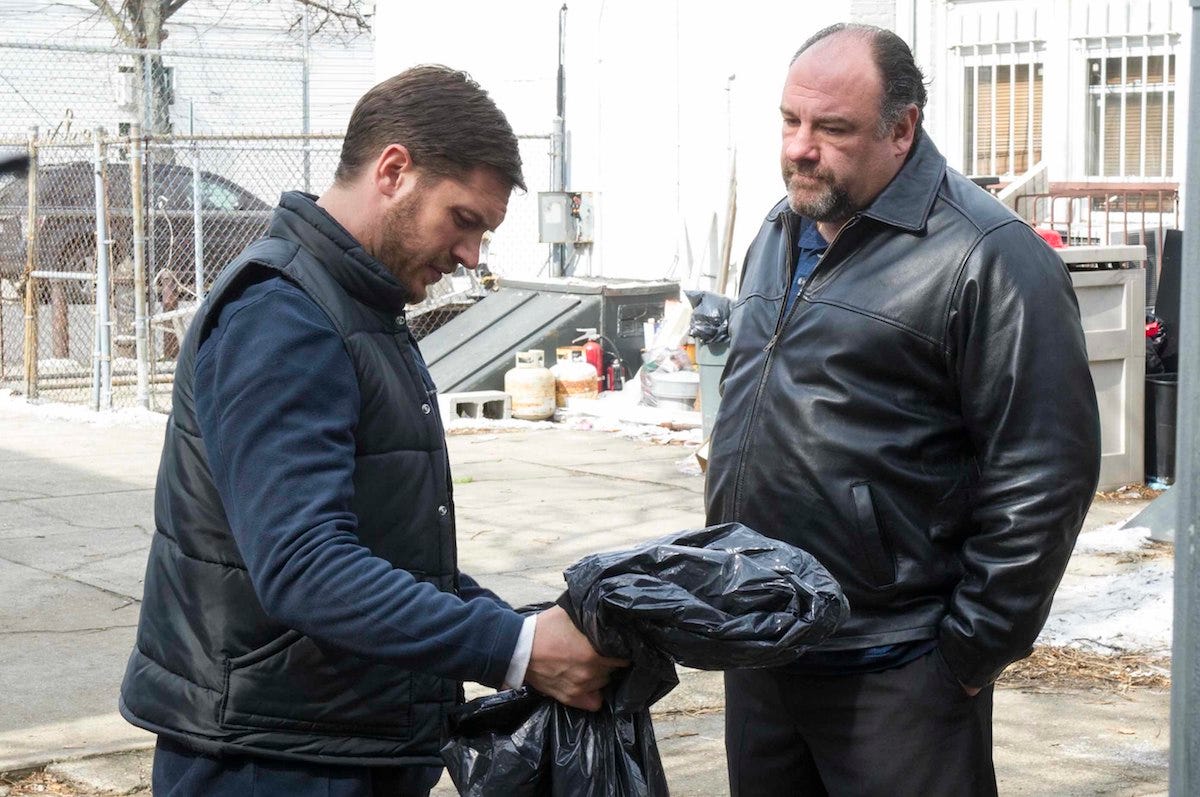'The Many Saints of Newark' Review
Plus: How Hollywood's below-the-line union could up-end the filmmaking business.
The Many Saints of Newark Review
Ray Liotta’s dual performance may be the key to understanding what David Chase is up to in The Many Saints of Newark.
In the early going, Liotta plays Aldo “Hollywood Dick” Moltisanti, an aging mobster who brings a beautiful wife back from the old country. He’s crass and crude, violent and vulgar. The sort that drops f-bombs around a priest and halfheartedly apologizes to the man of God—more for his outsized personality than any blasphemy. The sort that doesn’t think too much about throwing a woman down the stairs when she displeases him.
Later on, Liotta plays Hollywood Dick’s brother, Sally. Sally’s in prison and he is, in many respects, the exact opposite of Dick: quiet, introspective, and perceptive. When Hollywood’s boy Dickie (Alessandro Nivola) visits him for the first time in prison, Sally knows something’s up. Something other than Dickie’s stated desire to do a good deed. Sally prods Dickie with a wry smile and a knowing comment, but his baseline emotion for his brother’s son is withering contempt and scorn for his efforts to make amends with the universe while continuing to live his life of crime.
We see this most clearly when Dickie visits Sally in prison and describes to his uncle how he serves as a little league coach for blind kids; as Dickie’s talking, we cut to his memory of the game and hear one of the parents call Dickie a saint. The camera cuts back to Dickie in the prison and we see him smiling at the thought, but he looks up and—he’s alone. Sally has left the table. Sally has no time for Dickie’s rationalizations or his self-aggrandizement; he knows that his nephew is a murderous scumbag.
Clearly, Chase has always despised the rationalizations these characters make that let them feel like “good people” even as they live their lives of crime. Allow me to suggest, then, that Liotta’s Hollywood Dick is Chase’s projection of how “bad” fans of the show enjoyed The Sopranos while Liotta’s Sally is Chase’s stand-in: that of a Buddhism-spouting, jazz-loving, wise-beyond-his-station ruminator on the ugliness of not only This Thing of Ours but also America in general.
Once you accept that, certain other things click into place. Chase, who wrote the screenplay with Lawrence Konner, treats the most Sopranos-y elements of the story with what feels like disdain. I’m thinking mostly of the tendency to overexplain certain things, as when we’re first introduced to Christopher Moltisanti as a baby and he starts crying while being held by his cousin, Tony (Michael Gandolfini). The lesson here is obvious: fans of the show will know that Tony killed Christopher, and if you aren’t a fan and unaware of the show’s history, no worries, because Christopher’s ghost reminds us of this in an early voiceover, making the baby’s wails obvious, even on the nose. But if you’ve missed all that, don’t worry: an old woman at the table explains to us that babies carry knowledge from “the other side” over to our world.
Which, again: duh.
There are several such “duh” moments—I’m thinking John Magaro’s over-the-top impression of Steven Van Zandt playing Silvio Dante, or the moment when the goombahs set up a TV during a funeral and start watching it in the midst of the ceremony—that are similarly on the nose.
Contrasted with that is the film’s central plot, which has to do with race and class and the American dream as experienced in Newark. Set against the backdrop of Vietnam and race riots, Dickie runs up against a formidable foe in the form of Harold McBrayer (Leslie Odom Jr.). After working as Dickie’s bagman before fleeing the state on a murder warrant, McBrayer returns to town with his eyes set on running numbers in the black neighborhoods. Naturally, this sparks a gang war between the Sopranos and McBrayer’s nascent crew.
Wrapped up in this turf battle is a love triangle and increasing neighborhood integration that touch on the third rail of American life, race. It is here where Chase’s heart lies, here where he wants to make his mark with this movie. And here where he is, perhaps, feeling penitent himself, looking to do a good deed like Dickie, given that the black residents of Newark we were more likely to see on the show were gangbangers getting blamed for hits or crackheads getting rousted out of townhouses Tony Soprano had scooped up on the sly as part of a scheme to defraud the feds.
Ah yes: Tony. Played here in his teenage years by James Gandolfini’s son, Michael, Tony is the one figure of Sopranoslore that Chase treats with something other than polite scorn. Dickie is the only person Tony looks up to, really; he wants to go to college, sure, but he’s still intrigued by the life. He’s not above hijacking an ice cream truck or running some numbers at school. The appeal of the mobster ethos is never far.
There’s a really fantastic shot about midway through the movie when a younger Tony is standing in the doorway of Holsten’s restaurant as a cross-dissolve begins: Dickie begins to be superimposed over the boy and the dearly departed Christopher Moltisanti chimes in with a voiceover. The whole thing is just beautifully structured: I like the idea of Dickie’s presence as a shadow over Tony while Tony’s greatest betrayal speaks his mind, all framed in front of the place we, or possibly anyone, last saw Tony alive, Holsten’s restaurant.
Those prone to theorizing would likely suggest Chase is himself suggesting something here, using Holsten’s in this pivotal hinge moment and another scene later on, both of them integral points in Tony’s decision to pursue a life of crime. Those nudges at Holsten’s, the show’s closing moments at Holsten’s, the abrupt cut to black, well, certainly it’s clear now, right? It’s all quite obvious? Tony definitely got wha
In lieu of reviewing Venom: Let There Be Carnage this week, I went long on Tom Hardy and his (pretty great!) career. Read that here. Check out my podcast with Scott Tobias about his and Keith Phipps’s new Substack property The Reveal as well as the business of film criticism in general here. And if you haven’t listened to this week’s members-only episode of Across the Movie Aisle about musical biopics and whether or not they’re exhausted as a genre, make sure to listen to that here. Again, that’s a members-only ep, but good news if you’re not a member: you have two more days to get a month of B+ for free.
IATSE Strike Looms
A thing to keep an eye on next week: The International Alliance of Theatrical Stage Employees (ITASE), the umbrella union that represents Hollywood craftsmen running the gamut from cinematographers to prop makers to makeup artist to boom operators, will begin voting today on whether to authorize a strike.
A strike-authorization vote is not the same as a vote to strike, but it is a sign that the union feels its demands are not being taken seriously by the Alliance of Motion Picture and Television Producers. Those demands are manifold and also pretty reasonable.
The Entertainment Strategy Guy highlighted the economics of all this earlier in the week. You should read his piece, but the long and the short of it is that IATSE’s deal with streaming companies is based in an older understanding of streaming economics. Now that Netflix, Amazon, Apple, and other organizations are dumping billions upon billions of dollars into these productions, below-the-line folks believe they should be compensated better. Hard to argue with that.
Another issue has to do with working conditions, and this is a change that could potentially have a much bigger impact on the world of filmmaking. When you’re making a movie, time is almost literally money: you have very tight schedules that have to do with, among other things, how long you have access to actors and other key talent. And a screenplay has a certain number of things that simply have to be shot; you may be able to limit the number of setups (different angles and such), but there is information on the page that has to be captured on the screen. If you don’t get the shots in the allotted number of days, you’re either screwed or you’re spending a ton of money not to be screwed. Which still kind of screws you.
This leads to days on shoots being infamously long: a 12-hour day on set is a short day on set. Eighteen-hour days are not unheard of. Again, time is money, and time is measured in days, not hours. (Though this is another sticking point.)
Turns out IATSE and its members are kind of tired of this:
Film crews have worked 14-hour days, or longer, for generations. For many workers, those hours have been a badge of honor, proof of superior stamina and commitment to the craft. But that attitude has shifted significantly in recent years.
“The culture of the entire country is changing in terms of work-life balance,” says John Lindley, the president of the International Cinematographers Guild Local 600. “People realize their lives are as important to them as their work.”
Again: I think this is a much bigger potential change to the business of Hollywood than streaming residuals or covering health care shortfalls. A hard cap on hours worked—or a system of fines that would make long days less profitable—would have a bigger impact on budgeting than just about anything else the unions could do. It’ll be very interesting to see how this shakes out.
Assigned viewing: The Drop
I wrote about Tom Hardy at length this week without once mentioning one of my favorite of his movies, The Drop. Since it costars Hardy and James Gandolfini (RIP), and since this week also sees the new Sopranos movie debut, I thought it might be worth recommending to you here.
That said, both of those great actors get overshadowed by a dog. An adorably cute dog. A dog whose endangerment implicates us when the violence starts popping off onscreen because, dangit, we want that dog to be okay.








The Drop is one of my ten, definitely 20, favorite movies of all time. This is the best hw assignment ever.
As an IATSE member who got to vote twice yesterday (Because I am a dues paying member in good standing in 2 locals) let me thank Sonny for bringing this up in his column.
I have worked in the film and television business for over 30 years on both coasts. The conditions have never been worst than what they are now. I stopped working on set after too many Friday work days starting at 1:30 in the afternoon and finishing at 4:30 Saturday morning and then because the actor were so tired themselves had to reshot on another day. It's insane and so often counter productive.
The culprit is often the farce of getting anything green lit with fanciful budgets then have to be balanced on the backs of the crew to get done. The increase in meal penalties is not because we are greedy, it's because we want to have lunch after 6 hours and not go hungry or eat on the go as you work.
We are working people and we are proud of the work we do and our can do attitudes. I was on a zoom meeting and a decorator repeated over and over we make miracles happen and we do, but we deserve lives too to enjoy with family and friends.